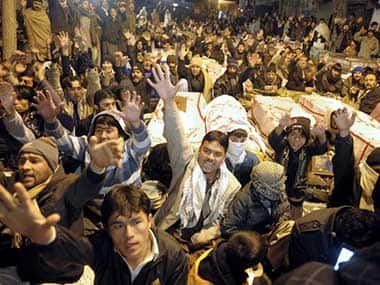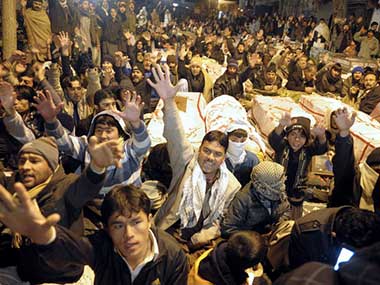Islamabad: As a protest by Hazara Shias at Quetta in southwest Pakistan entered its second day today, leaders of the vulnerable community said they would not bury over 80 victims of bomb attacks till the army takes control of the city and the provincial government is sacked. Thousands of protestors, including women, children and the elderly, joined a sit-in at Alamdar Road, a Shia-dominated neighbourhood where 92 people were killed in bomb blasts on Thursday. They huddled around more than 80 bodies, most of them wrapped in white shrouds and covered with plastic sheets to protect them from the rain. Hazara Shia leaders spurned a request from federal Religious Affairs Minister Khurshid Shah and provincial Governor Zulfiqar Magsi to bury the dead, saying their protest would continue till the army took control of Quetta, the capital of Balochistan province. The Shia leaders demanded targeted operations against militants and the imposition of Governor’s Rule. [caption id=“attachment_586081” align=“alignleft” width=“380”]
 Pakistani Shia Muslims gesture as they demonstrate and sit between the coffins of bomb blast victims in Quetta. AFP[/caption] Though the protest began over 30 hours ago, the Shia leaders complained that no ministers or elected representatives of Balochistan had met them to express solidarity or to discuss their demands. Many protestors shouted slogans against the government and the militant groups that have targeted the Shias. Religious Affairs Minister Shah ruled out the deployment of the army, saying the Prime Minister had already directed the paramilitary Frontier Corps to exercise all powers of the police to assist the civil administration in maintaining law and order. Many women dressed in all black broke down and wept while children and youths lit candles to pay tribute to the victims of the bombings. Shia leaders said the army should take control of Quetta as the provincial government had failed to stop attacks by notorious sectarian groups like the banned Lashkar-e-Jhangvi, which claimed responsibility for Thursday’s attacks. Roads around the Shia-majority neighbourhood were blocked with barricades and trucks and people were barred from entering the area. Large contingents of security forces were deployed in the area and Shia groups mobilised their volunteers to ensure security for the gathering. In a related development, Hazara Democratic Party chief Abdul Khaliq Hazara and his supporters began a three-day fast outside a police complex in Quetta to protest the attacks and to demand security for the community. During a news conference yesterday, top Majlis-e-Wahdatul Muslimeen leader Maulana Amin Shaheedi openly criticised powerful army chief Gen Ashfaq Kayani over the lack of security for Shias and other communities. Referring to an unprecedented three-year extension given to Kayani by the civilian government, Shaheedi said: “I ask the army chief: what have you done with these extra three years you got? What did you give us except more death?” Governor Magsi too acknowledged that the Balochistan government had completely failed to protect citizens. “It seems we have failed in governing. There is no need for us. It is better to have polls so that better people can come in and take care of this country,” he told the media after meeting victims of the bomb blasts. A string of bombings at Alamdar Road left 92 dead and over 160 injured in one of the bloodiest days of violence that Balochistan has witnessed for years. A suicide bomber targeted a crowded snooker club. As soon as journalists, police and rescue officials reached the site, a car bomb also went off. Most of the casualties were caused by the second blast. Prime Minister Raja Pervez Ashraf today directed Balochistan Chief Minister Aslam Raisani, believed to be on a private visit to Dubai, to immediately return to the country. Raisani, who usually spends more time in Islamabad than Quetta, has been the subject of constant criticism for his lack of interest in the affairs of Balochistan. A military transport aircraft, which was sent to Quetta on the orders of the premier, airlifted 15 critically injured people to Karachi so that they can be provided better treatment, officials said. Civil society and Shia groups organised protests against the bombings in Quetta in several cities, including Islamabad, Lahore, Karachi, Multan, Gujranwala, Hyderabad and Skardu. PTI
Pakistani Shia Muslims gesture as they demonstrate and sit between the coffins of bomb blast victims in Quetta. AFP[/caption] Though the protest began over 30 hours ago, the Shia leaders complained that no ministers or elected representatives of Balochistan had met them to express solidarity or to discuss their demands. Many protestors shouted slogans against the government and the militant groups that have targeted the Shias. Religious Affairs Minister Shah ruled out the deployment of the army, saying the Prime Minister had already directed the paramilitary Frontier Corps to exercise all powers of the police to assist the civil administration in maintaining law and order. Many women dressed in all black broke down and wept while children and youths lit candles to pay tribute to the victims of the bombings. Shia leaders said the army should take control of Quetta as the provincial government had failed to stop attacks by notorious sectarian groups like the banned Lashkar-e-Jhangvi, which claimed responsibility for Thursday’s attacks. Roads around the Shia-majority neighbourhood were blocked with barricades and trucks and people were barred from entering the area. Large contingents of security forces were deployed in the area and Shia groups mobilised their volunteers to ensure security for the gathering. In a related development, Hazara Democratic Party chief Abdul Khaliq Hazara and his supporters began a three-day fast outside a police complex in Quetta to protest the attacks and to demand security for the community. During a news conference yesterday, top Majlis-e-Wahdatul Muslimeen leader Maulana Amin Shaheedi openly criticised powerful army chief Gen Ashfaq Kayani over the lack of security for Shias and other communities. Referring to an unprecedented three-year extension given to Kayani by the civilian government, Shaheedi said: “I ask the army chief: what have you done with these extra three years you got? What did you give us except more death?” Governor Magsi too acknowledged that the Balochistan government had completely failed to protect citizens. “It seems we have failed in governing. There is no need for us. It is better to have polls so that better people can come in and take care of this country,” he told the media after meeting victims of the bomb blasts. A string of bombings at Alamdar Road left 92 dead and over 160 injured in one of the bloodiest days of violence that Balochistan has witnessed for years. A suicide bomber targeted a crowded snooker club. As soon as journalists, police and rescue officials reached the site, a car bomb also went off. Most of the casualties were caused by the second blast. Prime Minister Raja Pervez Ashraf today directed Balochistan Chief Minister Aslam Raisani, believed to be on a private visit to Dubai, to immediately return to the country. Raisani, who usually spends more time in Islamabad than Quetta, has been the subject of constant criticism for his lack of interest in the affairs of Balochistan. A military transport aircraft, which was sent to Quetta on the orders of the premier, airlifted 15 critically injured people to Karachi so that they can be provided better treatment, officials said. Civil society and Shia groups organised protests against the bombings in Quetta in several cities, including Islamabad, Lahore, Karachi, Multan, Gujranwala, Hyderabad and Skardu. PTI
Pak bombings: Shias in Quetta refuse to bury victims, demand Army control
FP Archives
• January 13, 2013, 10:57:16 IST
As a protest by Hazara Shias at Quetta in southwest Pakistan entered its second day today, leaders of the vulnerable community said they would not bury over 80 victims of bomb attacks till the army takes control of the city.
Advertisement
)